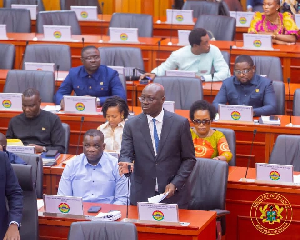Accra, Sept. 22, GNA - Vice President Aliu Mahama on Friday launched a book on the significance and limitations of the New Partnership for Africa's Development (NEPAD) authored by a Ghanaian academician and expert on Regional Integration.
The 106-page book, entitled: "Implementing the New Partnership for Africa's Development (NEPAD): Challenges and the Path to Progress" was written by Professor Samuel Kingsley Botchwey Asante, a Fellow, Ghana Academy of Arts and Sciences and a Council member of the National African Peer Review Mechanism Governing Council ((NAPRM-GC). The book, which has seven chapters, examines the developmental challenges confronting the African Continent and explores the relevance of NEPAD and the African Peer Review Mechanism (APRM) to the Continent's socio-economic development.
It opens with an introduction on the "NEPAD's Agenda for Africa's Development," and also features topics like "NEPAD: Its Significance and Commitments", "Implementing NEPAD: From Reform to Action", and "Implementing NEPAD at the National Level: A Case Study of Ghana." Vice President Alhaji Mahama said the book provided an opportunity for deep reflection on the developmental challenges confronting the Continent.
"The Continent is not only poor; it also suffers from inequality in incomes, inadequate access to essential services and pervasive insecurity," he said, adding that it was important strategies were sought now to reduce poverty in Africa.
Vice President Alhaji Mahama said NEPAD was crafted as a vision and development framework that had a high potential to enable Africa to move quickly towards a higher quality of life.
"The basis of NEPAD is a commitment by African Governments to practise good governance as a necessary precondition for economic growth.
"In response, the international community is expected to provide fairer market access for African products, debt relief and increased high quality aid flows to enable Africa Millennium Development Goals." Vice President Alhaji Mahama noted that NEPAD broke entirely new grounds that sought to instil principles, values, standards benchmarks and norms calculated to make Africa progressive, competitive and a valued partner in the international community.
He lauded Prof. Asante's for analyzing how Ghana made history by being the first country to submit herself for peer review, describing it as the "finest hour, a landmark achievement for Africa.
Prof. Asante said he was driven to write the book due to the limited knowledge about NEPAD as socio-economic programme for African renaissance, adding that the lack of sufficient information would contribute to the failure of the widely acclaimed Partnership. "A lack of sufficient knowledge contributed in no small measure to the failure of such past African development strategies as the celebrated Lagos Plan of Action or the African Priority Programme for Economic Recovery."
Prof. Asante said NEPAD should not be confined to the corridors of government but should be brought to the doorstep of the ordinary people for their active participation.
He observed that the Continent had embraced several development programmes and initiatives in the past that were stifled in the process of implementation either because the approach or planning process was ill-conceived or because the African leadership could not mobilize general support behind them.
Prof. Asante said the book was aimed at dispelling the erroneous notions and misinterpretations that had been associated with NEPAD including the view that the partnership was the creation of the Western world or a continuation of the failed structural adjustment programmes by the Breton Wood institutions.
Dr Francis Appiah, Executive Secretary of NAPRM-GC Secretariat, said a Head of States meeting on NEPAD would be held in Abuja, Nigeria on October, 29, 2006.
Prof. Samuel Kwesi Adjepong, Chairman, NAPRM-GC said NEPAD was a strategic development programme to improve the lot of Africans.
General News of Friday, 22 September 2006
Source: GNA












